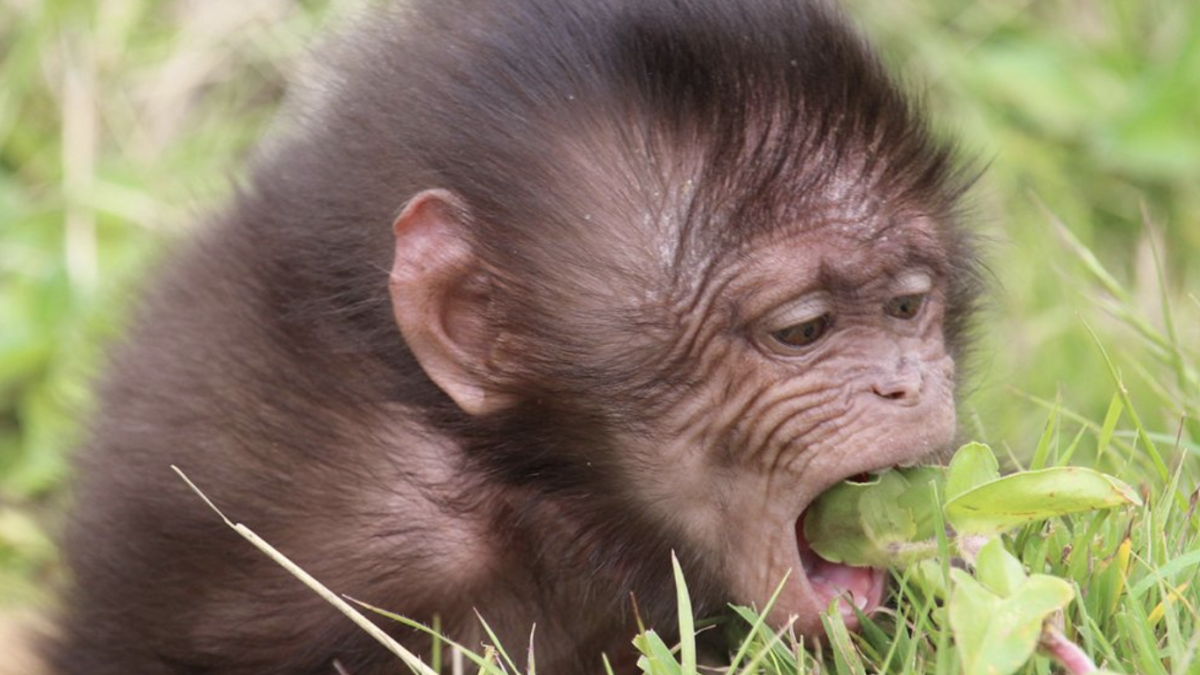Research of wild primate shows maternal effects key to gut microbial development

A baby gelada foraging in Simien Mountains National Park in Ethiopia. Their early-life gut microbiome, from infancy through first years of life, are shown to be maternally influenced as they get older. Photo credit: Sharmi Sen/University of Michigan
The bacteria that reside in the human gut, otherwise known as “the gut microbiome,” are known to play both beneficial and harmful roles in human health.
Because these bacteria are transmitted through milk, mothers can directly impact the composition of bacteria that their offspring harbor, potentially giving moms another pathway to influence their infant’s future development and health.
Now, a study of wild geladas — a non-human primate that lives in Ethiopia — provides the first evidence of clear and significant maternal effects on the gut microbiome both before and after weaning in a wild mammal.
This finding, published in Current Biology, suggests the impact of mothers on the offspring gut microbiome community extends far beyond when the infant has stopped nursing.
A research team co-led by Stony Brook University anthropologist Amy Lu and biologists Alice Baniel and Noah Snyder-Mackler at Arizona State University came to this conclusion by analyzing one of the largest data sets on gut microbiome development in a wild mammal.
They used high throughput DNA sequencing to identify and characterize the bacteria residing in the guts of young geladas and identified 3,784 different genetic strains of bacteria belonging to 19 phyla and 76 families. However, this diversity was not equally distributed across the developmental spectrum: similar to what is seen in humans, younger infants had the least diverse microbial communities that gradually became more diverse as they got older.
These changes reflected what the infant was eating, specifically when they switched from consuming milk to consuming more solid foods. These diet-focused bacteria actually help infants process foods — for instance, milk glycans, which cannot be digested without the help of bacteria.
However, it was the team’s findings of strong maternal effects on the infant gut microbiome both before and after weaning that was the most groundbreaking.
“Infants of first-time moms showed slower development of their gut microbiota, meaning that their guts were specialized toward milk digestion for longer compared to kids from other moms. This may put offspring of newer moms at a slight developmental disadvantage,” Baniel said. “In addition, even after infants were weaned, their microbiome community was more similar to mom’s than to other adult females in the population, suggesting that moms may be sharing microbes with their offspring.”
According to Lu, “Early life gut microbial development is known to have a large impact on later life health in humans and other model organisms. Now we have solid evidence that mothers can influence this process, both before and after weaning. Although we’re not 100% certain how mothers do this, one possible explanation is that they transfer specific bacteria to their offspring.”
According to Snyder-Mackler, “These early life changes might have far-reaching consequences – impacting the health and survival of these offspring once they become adults.”
Future work from this research team is therefore going to examine how differences in the gut microbiome during infancy influence other aspects of development, such as growth, the maturation of the immune system or the pace of reproductive maturation. Luckily, because they are continuing to study the same infants as they age, they’ll eventually be able to link the infant gut microbiome and the early-life maternal effects to health, reproduction and survival in adulthood.
The research was funded by several grants from the National Science Foundation, the National Geographic Society, the Leakey Foundation and from the University of Michigan, Stony Brook University and Arizona State University.
More Science and technology

4 ASU researchers named senior members of the National Academy of Inventors
The National Academy of Inventors recently named four Arizona State University researchers as senior members to the prestigious…

Transforming Arizona’s highways for a smoother drive
Imagine you’re driving down a smooth stretch of road. Your tires have firm traction. There are no potholes you need to swerve to…

The Sun Devil who revolutionized kitty litter
If you have a cat, there’s a good chance you’re benefiting from the work of an Arizona State University alumna. In honor of…

